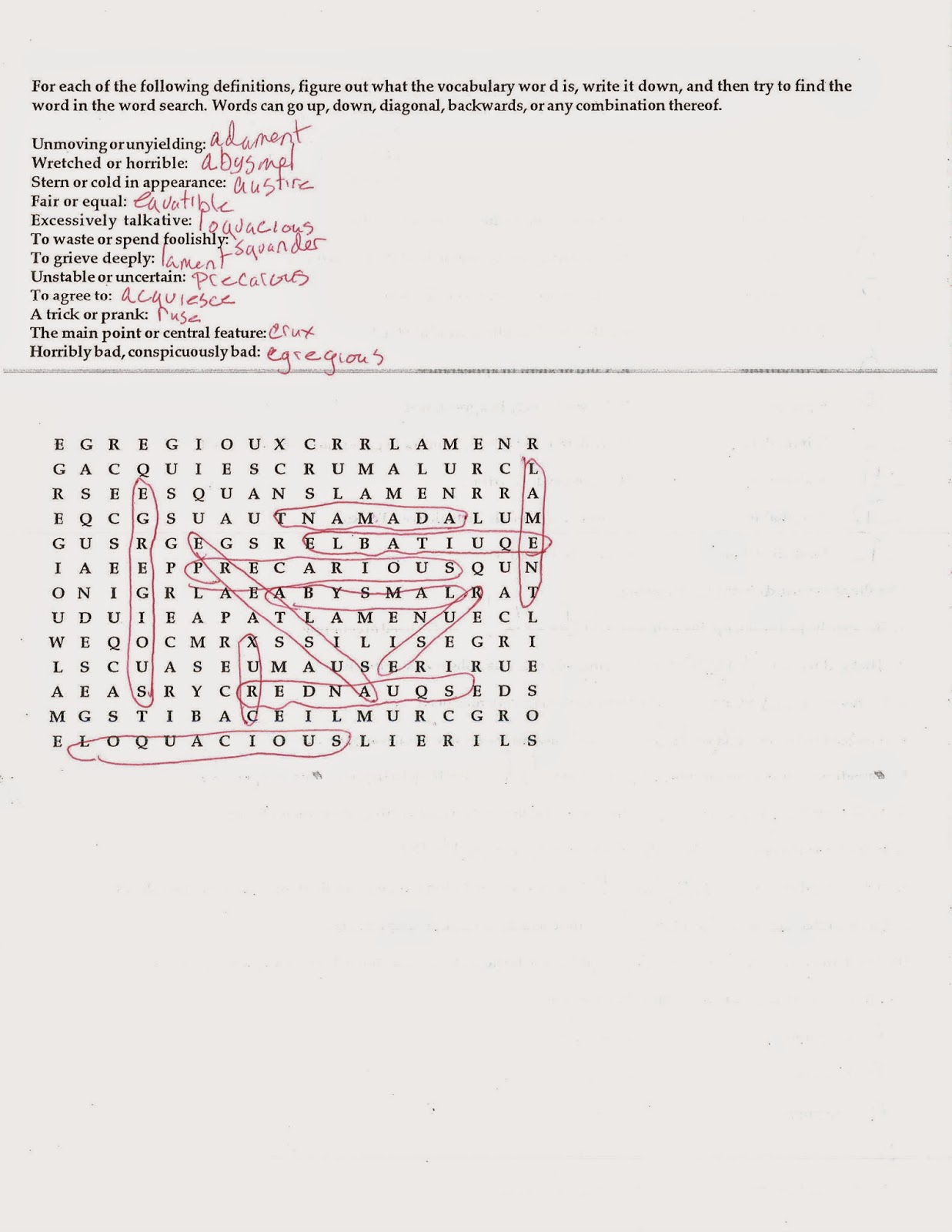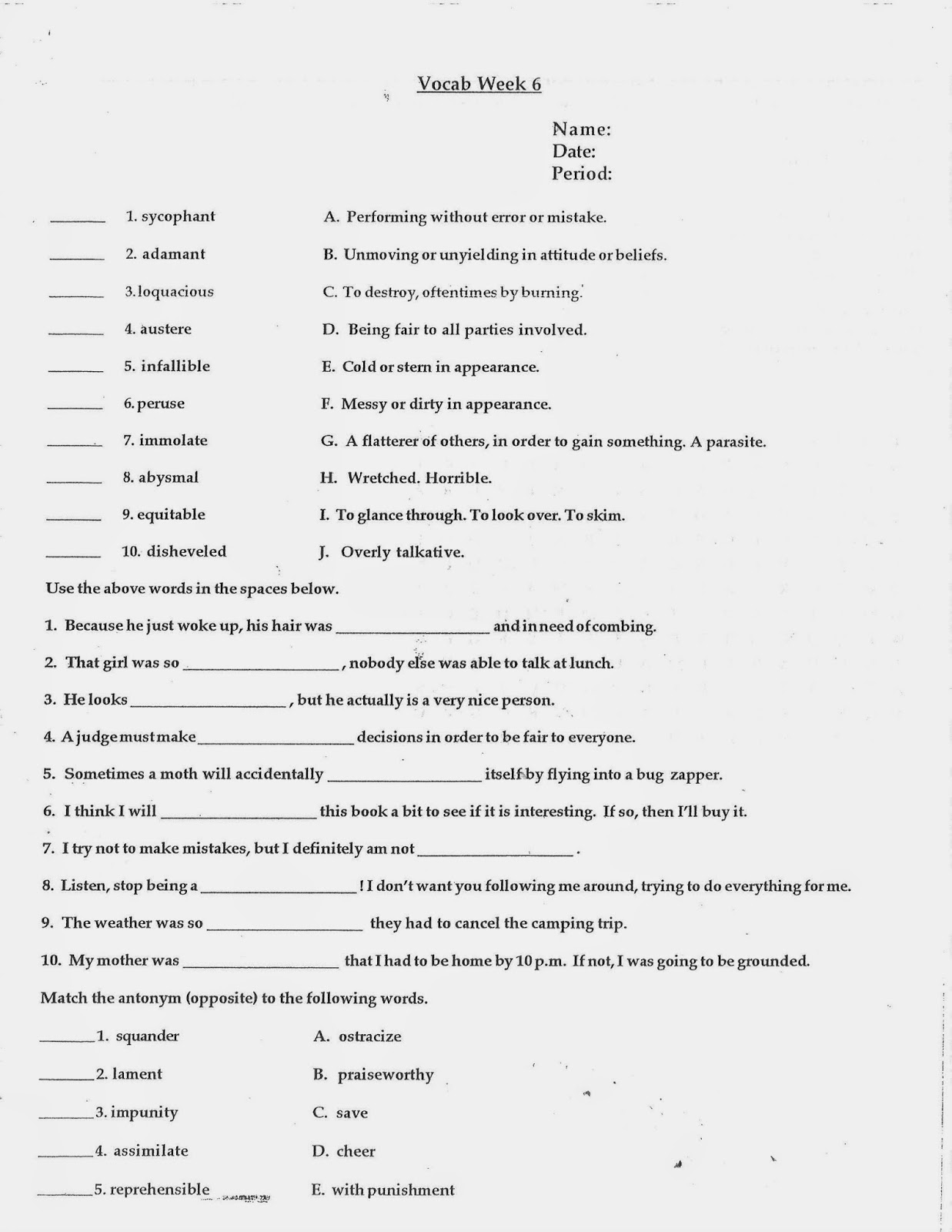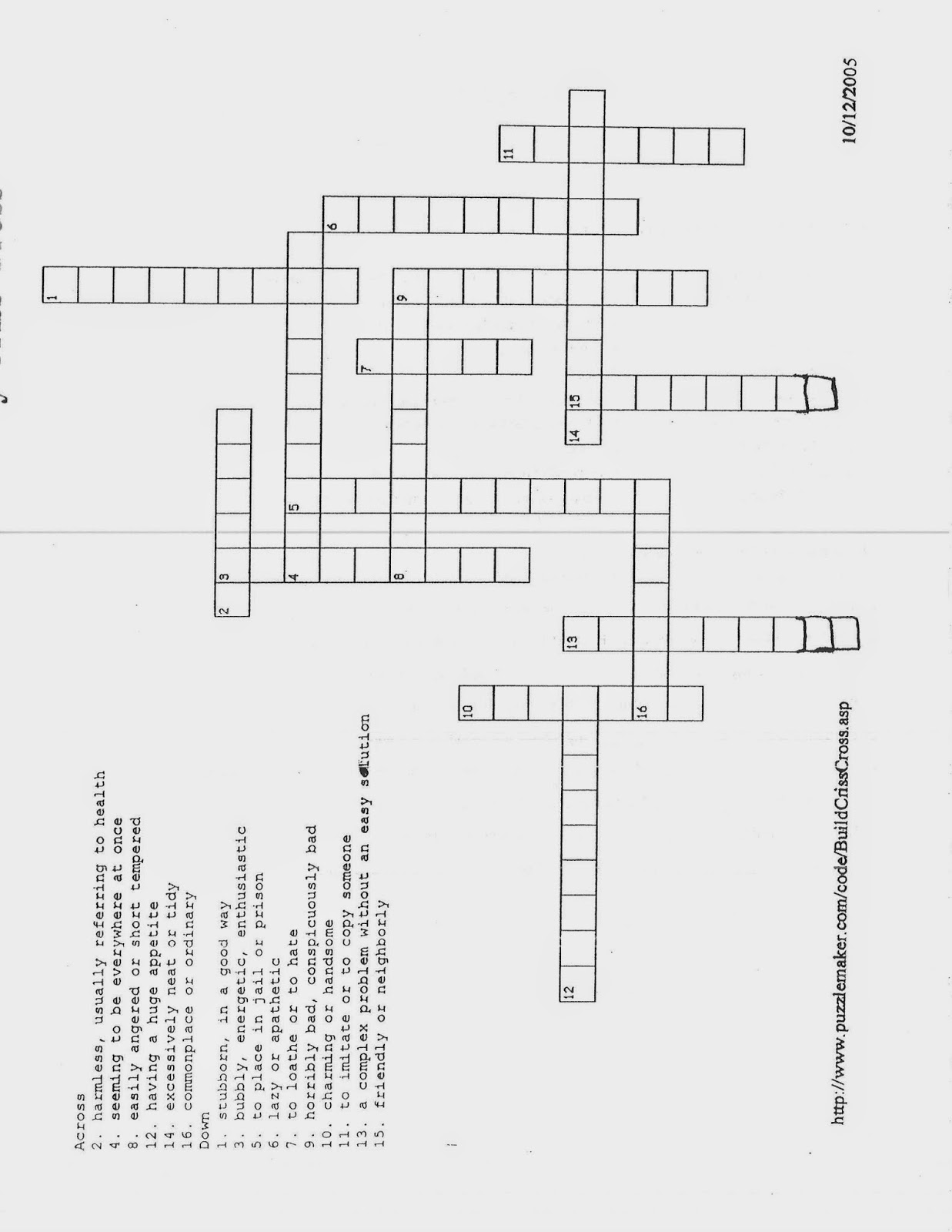Wednesday, October 29, 2014
Monday, October 20, 2014
Sunday, October 19, 2014
10/19/14 Week 6 Vocabulary Words, Definitions, Sample Sentences, and Pronunciations
Week 6 Word Pronunciations
1. sycophant - a servile follower, one who serves another in the hopes of a reward
2. adamant - unmoving in attitude, opinion, or belief
3. loquacious - extremely talkative
4. austere -- stern or cold in appearance
5. infallible -- incapable of making an error
6. peruse - to skim, to glance through something
7. immolate - to destroy, to get rid of; literally, to burn
8. abysmal -- wretched, horrible
9. equitable -- fair or equal
10. disheveled - messy or "ruffled" in appearance
1. The teacher's pet was an absolute sycophant.
2. My parents are adamant that I can't go to the movies, so that isn't going to change.
3. She is so loquacious, nobody else ever has a chance to speak.
4. My math teacher is austere, but she is actually a very nice person.
5. I am not infallible, so I know I will make mistakes from time to time.
6. I like to peruse a book before deciding whether I will buy it or not.
7. We are going to immolate the other team in the playoffs tonight.
8. The weather is abysmal, so the game will probably get rained out.
9. A judge has to be equitable when hearing a case.
10. After coming in out of the abysmal weather, her hair was disheveled.
1. sycophant - a servile follower, one who serves another in the hopes of a reward
2. adamant - unmoving in attitude, opinion, or belief
3. loquacious - extremely talkative
4. austere -- stern or cold in appearance
5. infallible -- incapable of making an error
6. peruse - to skim, to glance through something
7. immolate - to destroy, to get rid of; literally, to burn
8. abysmal -- wretched, horrible
9. equitable -- fair or equal
10. disheveled - messy or "ruffled" in appearance
1. The teacher's pet was an absolute sycophant.
2. My parents are adamant that I can't go to the movies, so that isn't going to change.
3. She is so loquacious, nobody else ever has a chance to speak.
4. My math teacher is austere, but she is actually a very nice person.
5. I am not infallible, so I know I will make mistakes from time to time.
6. I like to peruse a book before deciding whether I will buy it or not.
7. We are going to immolate the other team in the playoffs tonight.
8. The weather is abysmal, so the game will probably get rained out.
9. A judge has to be equitable when hearing a case.
10. After coming in out of the abysmal weather, her hair was disheveled.
Monday, October 13, 2014
10-13-14 Extra Credit Opportunity - Occelli Quote
"For a seed to achieve its greatest expression, it must come completely undone. The shell cracks, its insides come out and everything changes. To someone who doesn't understand growth, it would look like complete destruction." ~ Cynthia Occelli
Ponder this quote for a bit, and then answer the following question:
For us to achieve our greatest expression, is the growth process similar?
The more thought put into your response, the more points it will be worth. You can write your response and turn it in by Friday, or you can email me your response by Friday. Either way is fine. If you don't get the quote, but wish to earn some extra credit points, come see me during STAT. We can discuss the quote together, and then you can respond.
Ponder this quote for a bit, and then answer the following question:
For us to achieve our greatest expression, is the growth process similar?
The more thought put into your response, the more points it will be worth. You can write your response and turn it in by Friday, or you can email me your response by Friday. Either way is fine. If you don't get the quote, but wish to earn some extra credit points, come see me during STAT. We can discuss the quote together, and then you can respond.
Wednesday, October 8, 2014
10-8-14 Week 5 Vocabulary Word Pronunciations, Definitions, Sentences
Week 5 Vocab Word Pronunciations
Definitions:
1. squander - to spend foolishly or to waste
2. assimilate - to fit in, to blend in, to absorb, as into a culture
3. usurp - to take a position of power without the right or authority to do so
4. lament - to express deep sorrow, to grieve
5. covet - to desire something in the possession of someone else
6. ruse - a trick
7. reprehensible - deserving of blame or punishment
8. impunity - without punishment
9. solace - a source of relief, consolation or peace
10. beseech - to beg or to plead
Sample Sentences:
1. He will try not to squander his paycheck this time, so he can pay his rent.
2. When he went to Argentina, he tried to assimilate into their culture.
3. The people revolted and tried to usurp the throne from the evil dictator.
4. She began to lament the loss of her favorite dog.
5. It isn't good to covet your neighbor's house.
6. The boys tried to play a ruse on their camp counselor.
7. Egging the house was reprehensible, and the malicious boys deserved to be grounded.
8. He tried to sneak the cookies with impunity.
9. After her dog dried, her friends tried to bring her solace.
10. She tried to beseech her parents to let her go to the movies.
Definitions:
1. squander - to spend foolishly or to waste
2. assimilate - to fit in, to blend in, to absorb, as into a culture
3. usurp - to take a position of power without the right or authority to do so
4. lament - to express deep sorrow, to grieve
5. covet - to desire something in the possession of someone else
6. ruse - a trick
7. reprehensible - deserving of blame or punishment
8. impunity - without punishment
9. solace - a source of relief, consolation or peace
10. beseech - to beg or to plead
Sample Sentences:
1. He will try not to squander his paycheck this time, so he can pay his rent.
2. When he went to Argentina, he tried to assimilate into their culture.
3. The people revolted and tried to usurp the throne from the evil dictator.
4. She began to lament the loss of her favorite dog.
5. It isn't good to covet your neighbor's house.
6. The boys tried to play a ruse on their camp counselor.
7. Egging the house was reprehensible, and the malicious boys deserved to be grounded.
8. He tried to sneak the cookies with impunity.
9. After her dog dried, her friends tried to bring her solace.
10. She tried to beseech her parents to let her go to the movies.
Wednesday, October 1, 2014
10-1-14 EXTRA CREDIT ASSIGNMENT - Due on or before 10/3
Read the following legend:
Answer the following questions. As always, rephrase the question in your answer, answer in complete sentences, and explain your answers thoroughly. The better your answers, the more points you will receive.
1. After reading "The Cask of Amontillado," what were your feelings about the author, Edgar Allan Poe? Explain.
2. What are at least five similarities between this legend and "The Cask of Amontillado."
3. There is no proof that the above legend is true. What do you think? Explain your answer.
4. If this legend IS true, does it change how you feel about Poe? Explain why it does or why it does not.
5. In this legend, do you feel the actions of the soldiers against Green were justified? Explain.
6. (optional - also available for points) Draw or paint one of the scenes from "The Cask of Amontillado."
The Real Story Behind "The Cask of Amontillado"
Considered by some to be America’s first Pentagon, Fort Independence located on Castle Island in Boston Harbor, has a rich and important legacy in the chronicles of American history. Fort Independence also has a literal skeleton in its closet.
In 1817, a young lieutenant by the name of Robert F. Massie began his duties at Fort Independence and became quite popular with most of the troops stationed there. This popularity riled a fellow soldier, Captain Green, an individual who possessed the personality of a bully, coupled with an antisocial attitude. His crabby behavior resulted in the others at the fort keeping their distance from him.
On a snowy Christmas Eve in 1817, a number of the officers, including both Massie and Green, gathered for a game of cards. As midnight approached, the cards Lt. Massie held won him the pile of coins on the table. Apparently a sore loser, Captain Green challenged Lt. Massie to a duel by calling him a cheater and slapping him with a glove. Though not the young Virginian’s chosen way to celebrate Christmas, protocol of the day forced Massie to participate. After daybreak, the two opponents and their seconds met outside the gates of the fort. The seconds attempted to change Captain Green's way of thinking, but he would have nothing to do with the idea. A skilled swordsman, Green knew he had the advantage and in a matter of moments, his sword was driven through Massie’s rib cage. Carried to the infirmary by a number of his men, Massie was overheard to ask God's forgiveness, then died later that afternoon.
In the weeks which followed, a deep depression fell over the fort’s officers. According to historian Edward Rowe Snow, the men eventually erected a monument to honor their murdered friend on the spot where he collapsed. As the men attended to their duties, they began to harbor a desire for justice and revenge. Around the same time, Captain Green disappeared and was never seen again. Eventually he was labeled a deserter.
In 1827, a young soldier by the name of Edgar Allan Perry was stationed at Fort Independence. During the five months he served with the 1st United States Artillery Regiment, he learned of Captain Green’s disappearance. Perry began to research the situation and learned Castle Island’s famous oppressor possessed a bad reputation at several other posts where he was previously stationed. His research divulged the fact Lt. Massie was actually the seventh officer Green harassed to the point of mortal combat.
Further study revealed to Perry revenge for the death of Lt. Massey came one night when a number of officers, pretending to be on friendly terms with Captain Green, were able to get the officer roaring drunk. Hefty soldiers then lugged the intoxicated bully to an old dungeon. Here he was stretched out on the floor and shackled in iron hand and foot cuffs. Captain Green revived from his drunken stupor as the officers were leaving the room. He demanded an explanation, but his words fell on deaf ears as the officers proceeded to seal the wall with bricks. Now alone within the dark catacombs, it is likely Green experienced a horrible death within the next several days.
After Perry’s discovery of these events, word quickly permeated the whole of the fort. When it reached the ears of the fort’s commanding officer, he took Perry to task. The commander told Perry, “We respect the privacy of this fort. I must warn you that what you know about these incidents, you must keep to yourself. I realize this has come to be a celebrated case. Nevertheless, I want confidentiality here! Do I make myself clear?”
Years later, Perry continued to harbor within him a desire to tell this tale, yet he had given his word to the fort’s commanding officer. Thus, he changed the event’s setting and the names of those involved. He titled his work The Cask of Amontillado, and put his true name on it, Edgar Allan Poe. The story was first published in the November 1846 issue of Godey’s Lady’s Book. (Poe used the name ‘Perry’ when he enlisted in the army because he had accumulated an immense number of gambling debts and a warrant had been issued for his arrest.)
In 1905, a work crew was sent to Castle Island to learn the truth. During the inspection, an old basement was revealed. It was learned this dungeon was not shown on the original plans. Within the dungeon, a bricked-up wall was discovered. The call for pickaxes and lanterns immediately went out. When an opening was made large enough for a small man to crawl through, he entered with a lamp and quickly exited without it. The startled individual told the others he found a skeleton on the other side. The wall was quickly removed, and indeed a skeleton was found whose ankles and wrists were bound with shackles. Threads of an 1812 army uniform littered the floor. Due to the lack of forensic testing at that time, the skeleton was never identified and buried in a grave marked, ‘Unknown.’
Answer the following questions. As always, rephrase the question in your answer, answer in complete sentences, and explain your answers thoroughly. The better your answers, the more points you will receive.
1. After reading "The Cask of Amontillado," what were your feelings about the author, Edgar Allan Poe? Explain.
2. What are at least five similarities between this legend and "The Cask of Amontillado."
3. There is no proof that the above legend is true. What do you think? Explain your answer.
4. If this legend IS true, does it change how you feel about Poe? Explain why it does or why it does not.
5. In this legend, do you feel the actions of the soldiers against Green were justified? Explain.
6. (optional - also available for points) Draw or paint one of the scenes from "The Cask of Amontillado."
Subscribe to:
Posts (Atom)








